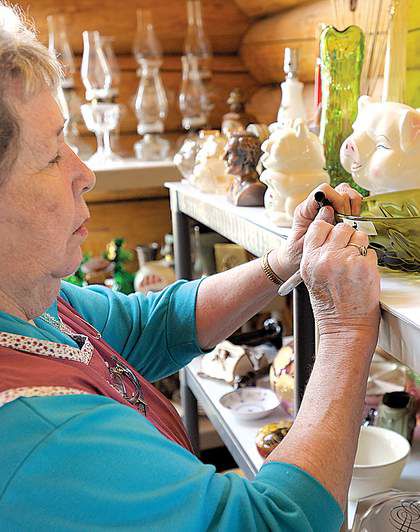Business of estate sales is changing
Published 5:00 am Sunday, May 15, 2011

- Deedy Whittington prices an item Thursday while preparing for an upcoming estate sale at a house near Tumalo.
Estate liquidation — the selling of assets upon the death of a person or a move to a smaller place — is not a new phenomenon. However, at least locally, some aspects of the old business are changing.
Two professional estate liquidators in Central Oregon — who assess value of possessions and determine whether they will sell most or all of it, for a percentage of the sales total — said antiques are no longer as popular as they once were. Instead, they said, in recent years many customers have been electing to splurge first on everyday household goods.
Trending
“Newly married (people) can get everything they need from an estate sale,” said Deedy Whittington, who with her husband, Norm, runs Deedy’s Estate Sales Co.
The Whittingtons’ operation, which calls for assistance from two other people in order to have an estate or moving sale almost every week, even in the cold-weather months, is one of just a handful in Central Oregon. It’s not unusual for 100 people to be ready to enter one of their sales upon the grand opening, usually 9 a.m. on a Friday.
Tracy Towry, an estate liquidator who runs Attic Estates and Appraisals, also reported seeing higher demand for commonplace items.
“Twenty-five years ago, people used to be after antiques,” Towry said. “Now people are a lot more into things that they remember from their childhood.” Modern, midcentury furniture — from the 1950s and ’60s — is in greater demand today, in his observation.
The change could be a function of a shift in estate and moving sales’ customer profile.
The oldest shoppers might have already filled their houses with purchases over the years, so they buy less now, said Nanette Hickman, another estate liquidator. She and her business partner, Miles Simpson, conduct estate and moving sales through their shop for antiques and other used things, Antiques Alley in northwest Prineville.
Trending
Younger people — baby boomers — are showing up in greater numbers at estate sales, Towry said. Rather than identify with certifiable antiques — things more than 100 years old — they might be quicker, Towry said, to spring for items they recall from their childhood, the midcentury things.
Still, a fair share of seniors populated the crowd of about 75 waiting to enter an estate sale Towry was running in Bend earlier this month.
Another possible reason Towry cited for the decline in the demand for antiques is the rising scarcity of the antique shop, which means fewer gung-ho antique buyers are perusing through estate and moving sales.
But Towry said he does regularly see a stream of younger shoppers.
“There’s a lot of young girls that come (who) like the retro stuff and that kind of thing,” he said.
One element of the estate-selling business that has not changed for Towry, Hickman and Whittington is how they know what a given thing is worth. The ability to give a price to an item is almost always based on each person’s decades of experience. Now and then, though, they do have to tap their resources to determine the right price.
Towry said he has several research tools, such as reference guides, to turn to when he’s not sure about the value of something, although it’s not a common occurrence, as he tends to see the same things over and over.
Hickman expressed reservations about relying on suggested prices, or even her own judgment, for some antiques.
“Antiques that I deem of any value at all, I go onto eBay (and search for) completed auctions — everything that has sold in the last 30 days and the price it has sold for — which is the true gauge for market value,” she said.
Even customers can help out in coming up with the right price for an item in certain cases, Whittington said.
“We’ll put it out and ask the customers what it is,” she said. “There’s a lot of knowledge about it.”
Estate liquidators don’t just show up at the start of a sale. Each has rules and ways of doing things, but generally they all follow a procedure.
First, an estate liquidator visits the home and asks the homeowner or relative to remove all goods they want to keep. The liquidator then cleans up the home and the goods, throwing out trash and other items unfit for sale along the way. (“Everybody saves things they shouldn’t — old decks of cards, half-opened napkins,” Towry said.) Then her team brings in tables, shelves or other furniture to put the goods on display and add price tags.
After the sale, the liquidator works with the homeowner or relative to determine what to do with leftovers, possibly boxing them, donating them or trying to sell them elsewhere.
In exchange for services, the liquidator takes somewhere near 30 percent of the total of the sales; the homeowner or relative takes the rest.
The three estate liquidators agreed that antique prices overall can be lower than owners or family members might expect them to be.
They also said, contrary to what some believe, the venture is not necessarily a cash cow.
Small wonder Hickman and Simpson also run their Prineville store. For Hickman, who said she has been doing estate and moving sales around Central Oregon on occasion — when the need arises — for two decades, it’s nice to have a retail store to return to.
Towry, who holds sales almost every week, said it can be difficult to maximize his earnings from sales, with clients hungry for the most dollars for assets and shoppers eager to save as much money as possible on their finds. He said he cuts down on overhead by not having full-time help.
Whittington said she does have to pay wages to her workers. But with about 700 recipients of her company’s regular e-mail blasts, and with word of mouth continually spreading, business keeps going.
“A lot of them tell friends or forward it on to their friends,” she said of the e-mails.
Plus, even at 71, after about 37 years of holding estate and moving sales, she plans to continue doing the work years into the future.
“Yeah, why not?” she asked. “I’m still physically able and mentally competent. I haven’t lost everything yet, so why not?”








